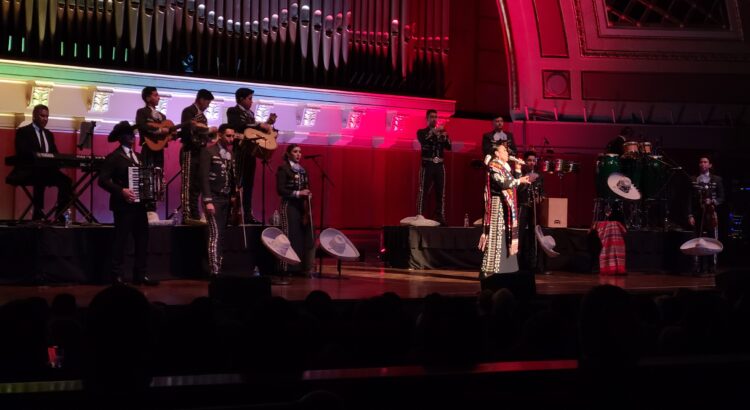8:00 pm • Friday, November 4, 2022 • Hill Auditorium
It struck me at some point during Friday’s performance that I was witnessing true mastery of an art form. Aida Cuevas and the musicians of Mariachi Aztlán–and their surprise guest, Valeria Cuevas, Aida’s daughter–demonstrated the kind of personality and confidence onstage that is only achieved by a lifetime of commitment to one’s craft. Aida in particular wowed me with her showmanship. Her banter with the audience felt warmly familiar, almost like they were all in on a little private joke. In a way, they were: conducted almost entirely in Spanish, the performance created a special celebratory bubble of Hispanic language and culture on a predominantly English-speaking, Euro-American campus. In an artistic environment that has historically been exclusive, Aida transformed Hill Auditorium into a space where Hispanics and Latinos were the insiders.
 Little moments throughout the evening added to the mood of familiarity and celebration. Before the performance started, El Ballet Folklórico Estudiantil, a dance and mariachi company from Flint, performed a short set in the lower lobby, a space where audience and performers seemed to intermingle at one level, as one community. When I sat down in the auditorium, the couple sitting next to me made small talk for a moment, asking whether I spoke Spanish and suggesting that some 10% of the audience wouldn’t understand a word of the performance, but attended because they love how the music sounds. Later, in a particularly sweet moment, Cuevas wished a young audience member a happy birthday, having chatted with the teen’s mother via Facebook Messenger some time before the event.
Little moments throughout the evening added to the mood of familiarity and celebration. Before the performance started, El Ballet Folklórico Estudiantil, a dance and mariachi company from Flint, performed a short set in the lower lobby, a space where audience and performers seemed to intermingle at one level, as one community. When I sat down in the auditorium, the couple sitting next to me made small talk for a moment, asking whether I spoke Spanish and suggesting that some 10% of the audience wouldn’t understand a word of the performance, but attended because they love how the music sounds. Later, in a particularly sweet moment, Cuevas wished a young audience member a happy birthday, having chatted with the teen’s mother via Facebook Messenger some time before the event.
The evening’s program took time to spotlight each performer, including the instrumentalists from Mariachi Aztlán. The improvised duet between the company’s pianist and percussionist especially has stayed with me–from my vantage-point on the main floor, I could see their hands flying across their respective instruments, exploring the synergy between their sounds. Near the middle of the performance, after Aida had left the stage to the band for their solos (and so she could complete a total costume change), her daughter, Valeria, entered in her mother’s place. Valeria’s voice balanced dynamically with her mother’s, adding richness to the program, especially their beautiful duet rendition of La Llorona.
Probably my favorite part of the evening was when Aida performed “El Pastor.” Aida’s voice is operatic in quality, and El Pastor exhibits her ability to deftly switch between vocal registers as well as her stunningly regular vibrato. She completed each of these challenging vocal maneuvers with ease; during the instrumental build-up to her vocal entrance, I even noticed as she jauntily tossed her microphone and caught it to reposition it in her hand.
If you didn’t make it to Friday night’s performance, I encourage you to take a look at the video attached below for a small sample of Aida Cuevas’s talent. One thing I know for sure is that should she return to Ann Arbor during my time here, I will be among the first in line for tickets.









